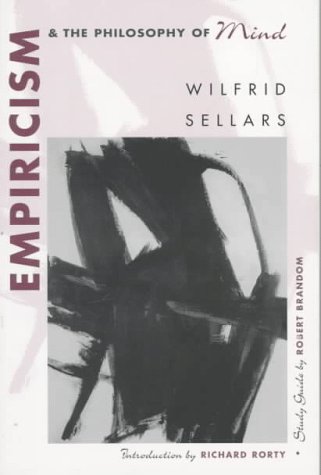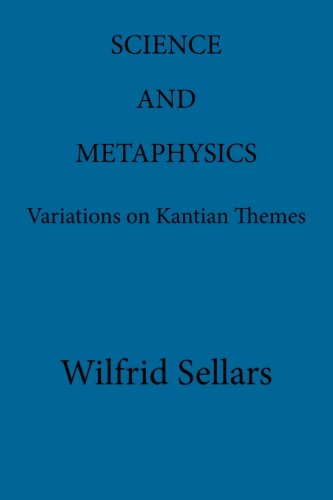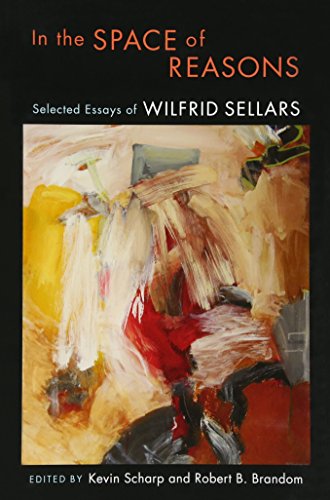Background
Sellars, Wilfrid Stalker was born on May 20, 1912 in Ann Arbor, Michigan, United States. Son of Roy Wood and Helen Maud (Stalker) Sellars.



( The most important work by one of America's greatest tw...)
The most important work by one of America's greatest twentieth-century philosophers, Empiricism and the Philosophy of Mind is both the epitome of Wilfrid Sellars' entire philosophical system and a key document in the history of philosophy. First published in essay form in 1956, it helped bring about a sea change in analytic philosophy. It broke the link, which had bound Russell and Ayer to Locke and Hume--the doctrine of "knowledge by acquaintance." Sellars' attack on the Myth of the Given in Empiricism and the Philosophy of Mind was a decisive move in turning analytic philosophy away from the foundationalist motives of the logical empiricists and raised doubts about the very idea of "epistemology." With an introduction by Richard Rorty to situate the work within the history of recent philosophy, and with a study guide by Robert Brandom, this publication of Empiricism and the Philosophy of Mind makes a difficult but indisputably significant figure in the development of analytic philosophy clear and comprehensible to anyone who would understand that philosophy or its history.
http://www.amazon.com/gp/product/0674251555/?tag=2022091-20

(Science and Metaphysics contains Sellars' John Locke Lect...)
Science and Metaphysics contains Sellars' John Locke Lectures. Besides considerable attention to doctrines of Kant's, Sellars presents "in systematic form the views I have developed and modified in paper after paper over the past twenty years."
http://www.amazon.com/gp/product/0924922117/?tag=2022091-20

( Wilfrid Sellars (1912-1989) was, in the opinion of many...)
Wilfrid Sellars (1912-1989) was, in the opinion of many, the most important American philosopher of the second half of the twentieth century. He was, Richard Rorty writes, "as original a mind as C. S. Peirce, and it has taken almost as long for the importance of his ideas to be appreciated." This collection, coedited by Sellars's chief interpreter and intellectual heir, should do much to elucidate and clearly establish the significance of this difficult thinker's vision for contemporary philosophy. The volume presents the most readable of Sellars's essays in a sequence that illuminates what Robert Brandom calls the "inferentialist" conception of meaning at the heart of his work. This conception, laid out in the early essays, is deployed in various epistemological contexts throughout the book so that, upon arriving at the concluding papers on Kant, the reader has been given a tour d'horizon not only of the central topics of philosophy of mind and language, but of much of the history of philosophy as well--and, with this, a sense of what a shifting of analytic philosophy from its Humean into its Kantian stage would entail.
http://www.amazon.com/gp/product/0674024982/?tag=2022091-20

(The systematic investigation of the metaphysical foundati...)
The systematic investigation of the metaphysical foundations of Epistemology. An accessible glimpse of the underpinnings of contemporary philosophy of mind, the relationship between mind and brain, cognitive science and philosophy of mind. The work is free from technical terms and perfectly accessible to those who seek an explanation for the direction being taken by research in psychology, cognitive science and philosophy.
http://www.amazon.com/gp/product/1520952171/?tag=2022091-20
Sellars, Wilfrid Stalker was born on May 20, 1912 in Ann Arbor, Michigan, United States. Son of Roy Wood and Helen Maud (Stalker) Sellars.
Bachelor, University of Michigan, 1933; Master of Arts, Buffalo State College, 1934; Master of Arts, Oxford (England) University, 1940.
University of Iowa, 1938 43. University of Minnesota, 1946 59. Promoted to Professor 1951.
Chair 1952-1959; Yale University, 1959-1963: from 1963, University Professor of Philosophy and Research Professor of the Philosophy of Science, University of Pittsburgh. 1950, with Herbert Feigl, founded Philosophical Studies, the first scholarly journal explicitly devoted to analytic philosophy, edited jointlyuntil 1971 and by Sellarsalone fora further three years.
( The most important work by one of America's greatest tw...)
( Wilfrid Sellars (1912-1989) was, in the opinion of many...)
(Eleven essays by Wilfrid Sellars, including "Empiricism a...)
(Philosophical Perspectives: History of Philosophy contain...)
(The systematic investigation of the metaphysical foundati...)
(Science and Metaphysics contains Sellars' John Locke Lect...)
Sellars' published work includes significant contributions to metaphysics and epistemology, to the philosophies of mind, language and science, and to moral philosophy and the theory of action, as well as to our understanding and appreciation of great historical figures from Plato to Kant. His writings are complex and conscientiously dialectical and synthesizing, typically undercutting accepted dichotomies and attempting to mediate conflicting intuitions. Advancing a comprehensive critique of the ‘myth of the given’, Sellars became a leading contributor to the ongoing Anglo-American critique of ‘the Cartesian concept of mind’ and the correlative shift of semantic attention from the categories of thought to those of public language. He saw philosophy as challenged to achieve a synthesis of the manifest image, the focal concern of 'perennial philosophy’, and the scientific image, still in the process of emerging from the fruits of theoretical reasoning, into a single synoptic vision. His own sketch of a synthesis was Kantian in spirit, but thoroughgoingly naturalistic and nominalistic. A sophisticated theory of conceptual roles, concretely instantiated in the conducts of representers and transmissible by modes of cultural inheritance, formed the basis for Sellars' treatment of both categorial ontological idioms and mentalistic intentional contexts. His own ontology combined a robust scientific realism with a form of linguistic nominalism which treated traditional categorial discourse as the classificatory discourse of a functional metalanguage transposed into the ‘material mode of speech’. His account of intentional contexts was marked by psychological nominalism the denial that any sort of commerce with abstract entities is an essential ingredient of mental acts, and his own alternative ‘verbal behaviourism’ constituted the original version of functionalism in the contemporary philosophy of mind.
Married Susanna Felder Downie, December 9, 1989.
